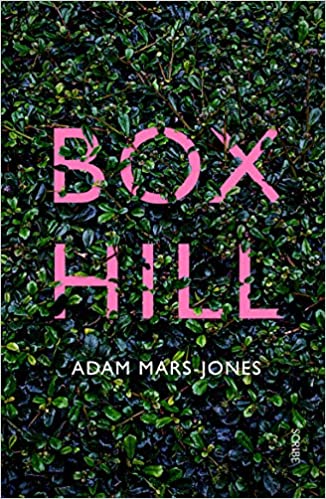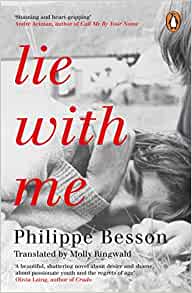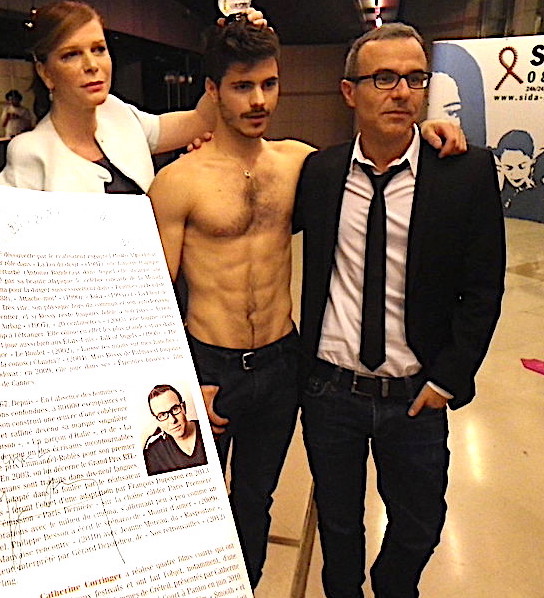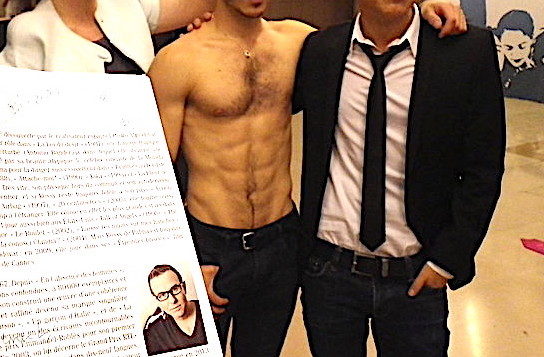 BOX HILL
BOX HILL
A Story of Low Self-Esteem
by Adam Mars-Jones
New Directions. 120 pages, $14.95
 LIE WITH ME: A Novel
LIE WITH ME: A Novel
by Philippe Besson
Translated by Molly Ringwald
Scribner. 148 pages, $16.
TWO SHORT NOVELS, one from England, one from France, remind us of the power of brevity and the pleasures of sadness. Brokeback Mountain is probably still the gold standard for this genre. Lie With Me, by Philippe Besson, has been called “the French Brokeback.” In fact, according to an interview he gave to The New Yorker, when Brokeback Mountain first came out, Besson was living in New York next door to a movie theater showing the film. He went back to see the movie every day for a week. Now that Lie With Me has sold over 120,000 copies in France and is being made into a film, he admits that with this book he wanted “to write a sadness.” Adam Mars-Jones, whose last two novels (2008’s Pilcrow and 2011’s Cedilla) were doorstops, has written a very short novel, Box Hill, that is equally sad, even if it’s presented as a sort of comic monologue subtitled “A Story of Low Self-Esteem.”
There are other similarities: both novels have first-person narrators, both are about social class, and both are what one could only call “regional.” Lie With Me is set in a nondescript town in a region of western France called the Charente. Box Hill is about two neighborhoods in metropolitan London, Hampton and Isleworth. Both are set in specific decades—Lie With Me in the 1980s, Box Hill in the ’70s—and both use cultural references (music, movies) with loving care to recreate a vanished time. And both are in the end very sad.
The latter quality, however, is their main strength, which makes one wonder: why is there pleasure in sadness—in art, at least? Brokeback Mountain was a tear-jerker for most gay men; I sat in my seat long after the credits, unable to move. Besson saw the movie again and again. His novel Lie With Me contains obvious parallels. Box Hill, on the other hand, is about a nebbish who’s taken in by a handsome biker. It’s the story of an eighteen-year-old English boy whose parents run a pharmacy. He’s five foot six, fat, myopic, and going nowhere. He dislikes the job for which he’s being trained—a gardener in public parks—and has never been looked at with desire by anyone. “As if a man is a man,” he thinks, “only if he takes no notice of me.” But Ray, the six-foot-five leader of a motorcycle club, a man with the most fastidious standards in motorcycles and leather jackets, does take an interest, and thus the story begins. “What am I going to do with you?” he asks our narrator. “Whatever you want to,” Colin replies.
In Lie With Me, the nerd falls in love with a charismatic high school classmate whose Achilles heel is his social class. The novel’s narrator is the son of the school principal, who insists that his son never learn to do manual work so he won’t be trapped in this farming town like everyone else. The boy he falls for is the son of a farmer who keeps a small vineyard and believes he has no chance of ever changing his station in life. As in Brokeback Mountain, we are at the bottom of the social scale; when reviewers in the U.S. referred to the two leads as cowboys, E. Annie Proulx, the author of the short story on which the movie was based, was quick to point out that in fact they were not even cowboys; they were closer to shepherds.
There is something going on now in gay literature that Brokeback Mountain may or may not have begun: the romance (if that’s the word for it) of the provinces, of the downtrodden, of the abused. When gay literature became popular in the 1970s, the complaint was that all the novels were about urban gays living in the so-called fast lane. Now we have books about gays living in the sticks. In France, Didier Eribon’s Returning to Reims (in which a French intellectual returns to his provincial roots) was followed by Édouard Louis’ The End of Eddy, which was set in a village in northern France. Among American writers, Garth Greenwell’s acclaimed What Belongs To You takes place in bleak Romania and stars a hapless, homeless hustler. Hanya Yanigahara’s A Little Life is a plunge into the lower depths of abuse and misery.
Lie With Me fits right in with these novels. The landscape of the town in which the boys live is not remembered for its bucolic beauty but for its bleakness. The adult man looking back has succeeded in school, escaped to Paris like Eribon and Louis, freed himself of the small-town homophobia, and is now remembering the backwardness of la France profonde. It’s the city versus the countryside, which may be why Lie With Me made me think of an even earlier predecessor—Balzac’s Eugenie Grandet, or even Edith Wharton’s Ethan Frome, about a tragedy in the boondocks of New Hampshire. All of these books are short, and all pack a wallop. They’re all by urban writers casting a horrified glance on the provinces, though Balzac, to be fair, left us with no illusions about Paris, and Wharton found New York society just as bleak as rural New England.

Mars-Jones’ novel, on the other hand, is a love letter to a vanished England, a glance back to the last decade before Margaret Thatcher. It opens with a very specific English geography lesson: “Box Hill where the bikers go, on a Sunday. Box Hill near Leatherhead in Surrey—jewel of the North Downs, rising almost 400 feet sheer above the river (that’s the river Mole).”
Lie With Me opens with an almost abstract setting: “One day—I can say precisely when, I know the date—I find myself in the bar of a hotel lobby in a provincial city, sitting in an armchair across from a journalist, a low round table between us, being interviewed for my latest novel, which recently came out.” The narrative maintains this austere tone throughout; Besson modeled his book on Marguerite Duras’ The Lover. But one could be watching a play by Racine: we sense immediately that we’re on our way to tragedy. Lie With Me is for this reason suspenseful from the start. Brilliantly plotted, it takes us remorselessly to a destination few readers will see coming.
Box Hill, on the other hand, seems for the first sixty or seventy pages to be a mild joke—the adventures of a nebbishy bottom living with a heroic biker who treats him more or less like a household appliance. Not that he doesn’t have feelings: “Dog. Pig. Slave. I don’t like to be called names.” On Saturday nights he must sit on the floor while his master Ray plays poker with his bike club and, with Ray’s permission, must service the guests whenever they want to take a break. Eventually he’s joined by another boy toy, Kevin, whose slender figure threatens the overweight Colin, who worries that Kevin may take Ray away from him. But when Kevin gives Ray a blowjob, “It wasn’t the way Kevin must have hoped,” Colin says. “It wasn’t a case of the beautiful biker-man feeding his hard-on to the pretty new boy whose ribs you can actually see. It was dutiful, somehow. … It was like Prince Philip opening a hospital annexe.”
There are lots of jokes in this book, and lots of wonderfully concrete details. Some old martial arts magazines that are yellowed with age “looked as if the years had peed on them.” There are affectionate lists of motorcycle manufacturers (many British makes were eventually replaced by Japanese ones) and notes on the change in fashion from black leather to neon colors. Colin, who will say nothing bad about Ray, has his standards, to which he himself does not measure up. When a potential hookup calls back to say he feels bad about rejecting Colin because of his weight, Colin replies: “I told him not to worry about it. I’m used to it. Being pear-shaped is fine, but only if you’re a pear.” His loyalty to Ray becomes quite poignant toward the end. “Ray was good to me—he was,” he says, looking back. “He was faithful and he was good to me. But I could never have loved someone who was only ever good to me. That was true before I met him and it’s true now.” In other words, he’s a masochist—not unlike Mikey Jarvis, his snobbish gardening boss, who “would happily drink the water out of flower-vases, so long as the vases belonged to Princess Margaret.” The first two-thirds of the book are primarily a black comedy. But then, in a six-word sentence, it suddenly changes perspective, and everything begins to deepen and thicken until the real object of this book, the true pathos, is revealed—not at all where the reader expected it to be.
The grief in Lie With Me comes as a shock as well, though one was aware there was something doomed about the love between the narrator and his classmate. Even worse, the author, the narrator, goes to great lengths to tell us that all of this really happened. The name of the beloved, Thomas Andrieu, is the name of the person to whom the book is dedicated. The letter Thomas sends is the same letter, Besson has said in an interview, that prompted him to write the book when he received it in real life. And the photograph on the cover of the French edition—a young man with tousled hair wearing a red plaid shirt—is the photograph the narrator describes himself taking in the novel. We’re told that the story took place in a real town called Barbezieux. (Though the narrator also says that “Barbezieux does not exist,” it does). Yet Lie With Me is not called a memoir; it’s subtitled “A novel.”
Lie With Me’s French title is Arrête avec tes mensonges, which means literally “Stop with your lies!” “I’ve always loved … to invent the lives of strangers in passing,” the narrator tells us in the book’s first paragraph as he sits with the journalist watching people going by their table. “It’s almost an obsession. I believe it started when I was a child. I remember it worrying my mother. ‘Stop with your lies!’ she would say. She used the word ‘lies’ instead of ‘stories’ but nevertheless it continued, and years later, I still find myself doing it.” Besson must have had some say in the English title of his book (translated by the actress/writer Molly Ringwold). Lie With Me is a double entendre: Lie/sleep/have sex with me, and Lie/pretend/make up stories with me. On the other hand, Box Hill makes no effort to be “true” in the sense that Besson says his book is; we understand that Adam Mars-Jones is adopting the voice of a teenager for “a story of low self-esteem.” Yet even though it’s fiction, we believe it and are moved by it.
Besson’s tale would be effective either way, which makes one wonder why he goes to such lengths to make us think it really happened. When readers ask a novelist, “Did that really happen to you?” the writer usually takes it as both a compliment and an irritant. Why does the reader want to know? If it didn’t happen, does that reduce its value? The movie Brokeback Mountain was based on a short story by Annie Proulx, entirely imagined, but we weep at the end anyway, just as we feel the pleasure of sadness in both of these well-written short novels, both of them well worth reading.
That we’ve moved beyond the urban novel and are now in a moment of gay weepers about doomed love, bleak environments, and the pathos of social class is an interesting comment on where gay culture has gone, though I’m at a loss to say what it means. Perhaps it’s just that in the case of these two novels, looking back always involves a sense of loss, and the greatest loss is death.
Andrew Holleran is the author of the novels Dancer from the Dance, Nights in Aruba, The Beauty of Men, andGrief.






